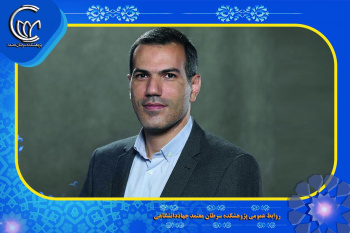Head of the Medical Informatics Department at the Motamed Cancer Research Center of ACECR stated:Developing a Diagnostic System for Breast Cancer using Artificial Intelligence

Dr. Atashi, who holds a specialized doctoral degree in Medical Informatics, continued: This technique, due to its high accuracy and speed in analyzing medical images, has been recognized as an effective solution in diagnosing brain lesions and breast cancer in the medical field. He added that the diagnostic assistance system for breast cancer has been designed to address the high likelihood of breast cancer occurrence in Iran and the need for accurate and rapid diagnosis methods. He stated: For the implementation of this project, we collaborate with specialists and teams in the medical and artificial intelligence fields, as well as cooperation with hospitals and medical centers to gather medical data and analyze them. With the execution of this project, we hope to enhance the accuracy and speed of breast cancer diagnosis and improve the lives of patients.
The head of the Medical Informatics Department at the Motamed Cancer Research Center ACECR also discussed about the progress, completion time of the project, and commercialization of the product, saying: Currently, our first products are operating as a decision support system for medical images on the largest picture archiving and communication system (PACS) in the country, and they are active in several hospitals. However, considering the complex and multidimensional nature of issues in diagnosing brain lesions and breast cancer, continuous development and increasing accuracy are essential. We will gradually increase the number of contracting hospitals.
He addressed the challenges and obstacles in implementing this project and the solutions to overcome them: Some challenges and obstacles that may exist in implementing this project, or any other medical product, are legal issues in the process of obtaining commercialization licenses. Acquiring a license requires providing clinically provable data, which, for this purpose, necessitates collaboration with medical experts and centers to validate the accuracy and credibility of the product. He also mentioned the lack of sufficient data and financial and managerial issues as other obstacles: Designing and developing artificial intelligence products require sufficient and accurate clinical data. In the absence of sufficient data, the accuracy and efficiency of the product may decrease. Furthermore, the development of artificial intelligence products requires significant investment and precise resource management. There might be challenges in attracting investment and resource management.
Furthermore, to design and develop medical products, collaboration with medical experts and medical centers to validate the accuracy and credibility of the product is necessary. Dr. Atashi emphasized that for success in implementing research projects related to artificial intelligence in medical imaging, access to sufficient financial and human resources is crucial, and utilizing the capabilities of students and professors in this field is essential. He added: Additionally, we should support new technical and technological capabilities in this area and strive for research projects to serve the community and improve the health status of the country. In this regard, we need to have cooperation and communication with medical centers and hospitals, pay attention to the real needs and problems of medical centers, have sufficient financial and human resources, and support new technical and technological capabilities in this field.
In conclusion, Dr. Atashi responded to the question of the level of trust placed in young people at ACECR and the importance of nurturing the "We Can" spirit and developing faithful and distinguished scientific personalities: Jahad University, as an educational and research institution, expects young individuals to use their potential to serve the community and contribute to the country's development. Strengthening the "We Can" spirit and cultivating faithful and distinguished scientific personalities are of great importance at ACECR. Unfortunately, over the past years, systematic issues in other parts of the country's research system have also affected this institution to some extent. These problems, such as disparities in project approval or irrational bureaucracy, coexist with leadership issues. In this institution, young individuals, as future potentials, should, with religious and ethical values alongside scientific and technical abilities, serve the community and contribute to the country's development. Therefore, strengthening this spirit and nurturing distinguished scientific personalities should be considered as the main objectives of ACECR, along with the training of future managers.
This university activist added: To strengthen the "We Can" spirit and nurture distinguished scientific personalities at ACECR, strategies such as teaching religious and ethical values, encouraging and rewarding individuals with outstanding performance, creating a healthy environment based on cooperation and trust, developing individual and social skills, providing psychological counseling and support, etc., can be utilized. Furthermore, strengthening relationships with industry and society, as one of the ways to enhance the scientific and technical level of university students, contributes to the success of ACECR. He concluded by stating that ACECR, as a manifestation of knowledge, faith, and action, with the potential and capabilities of university elites, can contribute to the development of the country in various scientific, technical, and cultural fields. Some roles that ACECR can play in advancing knowledge-based progress in the country include "raising the scientific and technical level of the country by educating university elites and encouraging them to engage in scientific research," "promoting the scientific and technological culture of the country," "achieving sustainable development," "developing knowledge-based industries through educating university elites," "encouraging them to be entrepreneurial and developing knowledge-based industries," and "promoting ethical and religious values."




Your Comment :